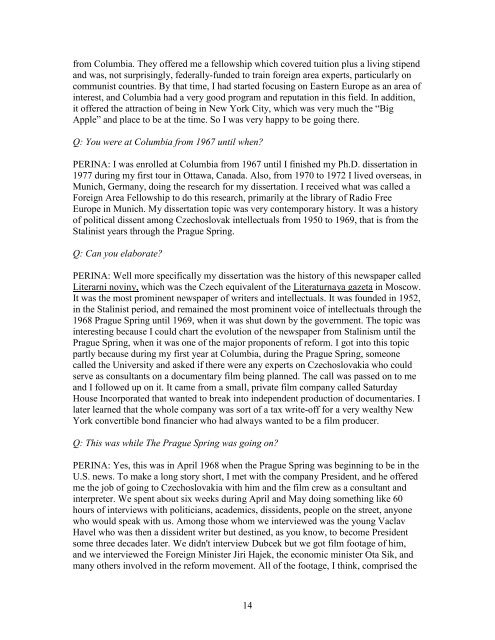ambassador rudolf v. perina - Association for Diplomatic Studies and ...
ambassador rudolf v. perina - Association for Diplomatic Studies and ...
ambassador rudolf v. perina - Association for Diplomatic Studies and ...
You also want an ePaper? Increase the reach of your titles
YUMPU automatically turns print PDFs into web optimized ePapers that Google loves.
from Columbia. They offered me a fellowship which covered tuition plus a living stipend<br />
<strong>and</strong> was, not surprisingly, federally-funded to train <strong>for</strong>eign area experts, particularly on<br />
communist countries. By that time, I had started focusing on Eastern Europe as an area of<br />
interest, <strong>and</strong> Columbia had a very good program <strong>and</strong> reputation in this field. In addition,<br />
it offered the attraction of being in New York City, which was very much the “Big<br />
Apple” <strong>and</strong> place to be at the time. So I was very happy to be going there.<br />
Q: You were at Columbia from 1967 until when?<br />
PERINA: I was enrolled at Columbia from 1967 until I finished my Ph.D. dissertation in<br />
1977 during my first tour in Ottawa, Canada. Also, from 1970 to 1972 I lived overseas, in<br />
Munich, Germany, doing the research <strong>for</strong> my dissertation. I received what was called a<br />
Foreign Area Fellowship to do this research, primarily at the library of Radio Free<br />
Europe in Munich. My dissertation topic was very contemporary history. It was a history<br />
of political dissent among Czechoslovak intellectuals from 1950 to 1969, that is from the<br />
Stalinist years through the Prague Spring.<br />
Q: Can you elaborate?<br />
PERINA: Well more specifically my dissertation was the history of this newspaper called<br />
Literarni noviny, which was the Czech equivalent of the Literaturnaya gazeta in Moscow.<br />
It was the most prominent newspaper of writers <strong>and</strong> intellectuals. It was founded in 1952,<br />
in the Stalinist period, <strong>and</strong> remained the most prominent voice of intellectuals through the<br />
1968 Prague Spring until 1969, when it was shut down by the government. The topic was<br />
interesting because I could chart the evolution of the newspaper from Stalinism until the<br />
Prague Spring, when it was one of the major proponents of re<strong>for</strong>m. I got into this topic<br />
partly because during my first year at Columbia, during the Prague Spring, someone<br />
called the University <strong>and</strong> asked if there were any experts on Czechoslovakia who could<br />
serve as consultants on a documentary film being planned. The call was passed on to me<br />
<strong>and</strong> I followed up on it. It came from a small, private film company called Saturday<br />
House Incorporated that wanted to break into independent production of documentaries. I<br />
later learned that the whole company was sort of a tax write-off <strong>for</strong> a very wealthy New<br />
York convertible bond financier who had always wanted to be a film producer.<br />
Q: This was while The Prague Spring was going on?<br />
PERINA: Yes, this was in April 1968 when the Prague Spring was beginning to be in the<br />
U.S. news. To make a long story short, I met with the company President, <strong>and</strong> he offered<br />
me the job of going to Czechoslovakia with him <strong>and</strong> the film crew as a consultant <strong>and</strong><br />
interpreter. We spent about six weeks during April <strong>and</strong> May doing something like 60<br />
hours of interviews with politicians, academics, dissidents, people on the street, anyone<br />
who would speak with us. Among those whom we interviewed was the young Vaclav<br />
Havel who was then a dissident writer but destined, as you know, to become President<br />
some three decades later. We didn't interview Dubcek but we got film footage of him,<br />
<strong>and</strong> we interviewed the Foreign Minister Jiri Hajek, the economic minister Ota Sik, <strong>and</strong><br />
many others involved in the re<strong>for</strong>m movement. All of the footage, I think, comprised the<br />
14
















